What is it about the grip of a guitar in Alex Turner’s hands that transforms a simple chord into an electrifying anthem? Many have asked this question, and as someone who’s delved into the world of guitarists, I’ve found that *Turner, the enigmatic Arctic Monkeys guitarist, possesses an alchemy few can replicate*. As I browsed through his journey of guitar evolution, from the visceral charms of the Fender Jazzmaster to the daring allure of Gretsch Guitars, it became evident that there’s more to his craft than just choice of equipment.
But there’s a question lingering above all: *what makes him a beacon in the modern rock scene*? It’s not merely technical skill or charismatic stage presence, but rather a fusion of both with a unique touch and stylistic flair. Join me as we explore the depths of Alex Turner’s guitar journey, uncovering the secrets behind his signature sound that has captivated audiences worldwide.
Who is Alex Turner?

In my years covering music, few artists blend lyrical poetry with strong melodies as Turner does, a quality I deeply appreciate as a guitar enthusiast. Alex Turner, the enigmatic frontman of the Arctic Monkeys, is a fascinating figure whose music style resonates with many because of his ability to weave complex narratives into compelling melodies. From **Sheffield** to the world’s stages, his journey is one of relentless innovation and discovery.
Did you know that Alex Turner started writing music before mastering the guitar? This revelation might surprise those who recognize him as one of today’s best guitarists. It speaks to the innate artistry that Turner possesses—a testament to his profound understanding of music beyond technical prowess. As someone who has followed his career closely, I am continually amazed by his evolving sound and ability to reinvent his style while maintaining a distinct identity.
Turner’s early days saw him scrawl lyrics and melodies, propelled by a fervent desire to express himself. This foundation in songwriting has significantly influenced his approach to guitar-playing, making his musical narratives as vibrant as his riffs. As we delve deeper into the specifics of his guitar equipment and techniques, this foundational knowledge of his past becomes ever more relevant, providing critical context for understanding how the instruments became extensions of his storytelling prowess.
What Guitars Does He Use?
Fender Jazzmaster
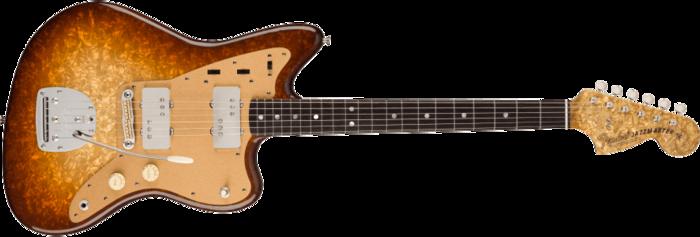
As a long-time admirer of the Fender Jazzmaster, I’ve witnessed first-hand how its unique tonal capabilities align beautifully with Alex Turner’s innovative style. When exploring Arctic Monkeys gear, the Jazzmaster stands out with its distinctive sound profile and offset body shape, which complements Alex’s dynamic play. It’s not just the looks; the Jazzmaster’s versatile tone provides a rich, full-bodied sound, perfect for the diverse palette Turner employs in his compositions. The guitar’s responsive pickups and floating tremolo offer the flexibility and expressiveness that are emblematic of Turner’s work.
Integrating the Jazzmaster into his arsenal allows Alex to blend traditional rock roots with experimental sounds, creating a unique auditory experience that has been a hallmark of Arctic Monkeys’ evolution. This instrument’s role in shaping the band’s sonic identity underscores its significance as a cornerstone in Turner’s guitar journey, bridging the gap to his other favorites like Gretsch Guitars.
Gretsch Guitars
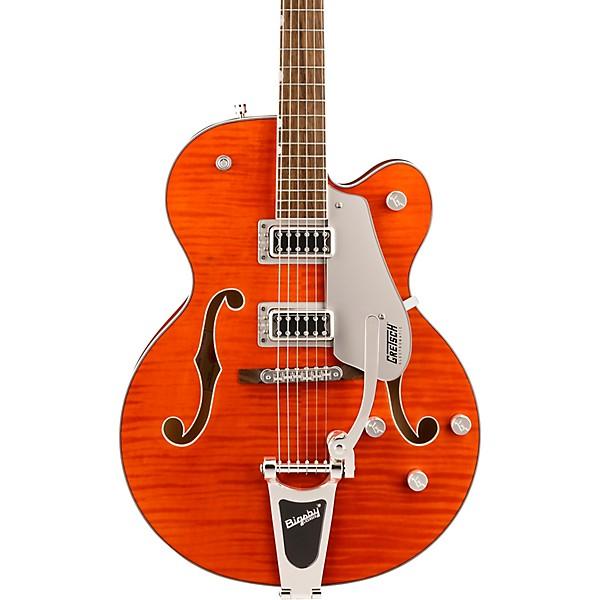
Having delved deeply into Alex Turner’s guitar journey, I’ve discovered how prominently Gretsch guitars feature in crafting his distinctive sound. Known for their unique tone and style, Gretsch guitars provide a vintage yet modern feel, which beautifully complements Turner’s evolving music, especially evident in Arctic Monkeys’ later albums. Throughout my time in music journalism, I have found that these guitars carry a historic weight, adding a layer of richness to Turner’s soundscape. Their resonant and twangy tones serve as a perfect canvas for his expressive and intricate playing style, enhancing the stylistic shifts every fan of the band can appreciate. The strategic incorporation of Gretsch into Turner’s array brings forth a sublime fusion of classic rock and avant-garde tones, underscoring his musical evolution. As we explore further, it becomes clear that his guitar choices deeply influence his artistry, offering a telling insight into his creative genius.
Ovation Viper
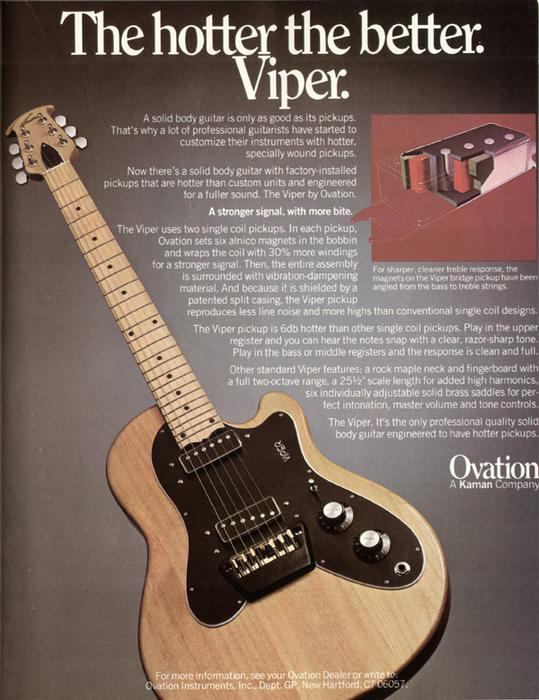
Having explored various guitar brands, I have come to appreciate the unique character that the Ovation Viper contributes to Alex Turner’s arsenal. The Viper’s design stands out boldly with its solid body and thin, gloss-finished neck. While Alex is often associated with more traditional guitars like the Fender Jazzmaster, his utilization of the Ovation Viper showcases his willingness to experiment with different guitar equipment to create a sound that’s uniquely his own.
The Viper, with its distinct tonal qualities, complements the richness of Arctic Monkeys’ sound. Whether it’s for live performances or recording sessions, this guitar adds an unexpected layer, highlighting Turner’s innovative spirit. As part of Alex’s curated selection, the Ovation Viper is not just an addition but a statement piece that reflects his journey from indie rock beginnings to global stardom. This section seamlessly transitions into discussing Alex’s early start with guitars, illustrating how each choice along the way has fortified his position as a pioneering musician.
When Did He Start Playing Guitar?
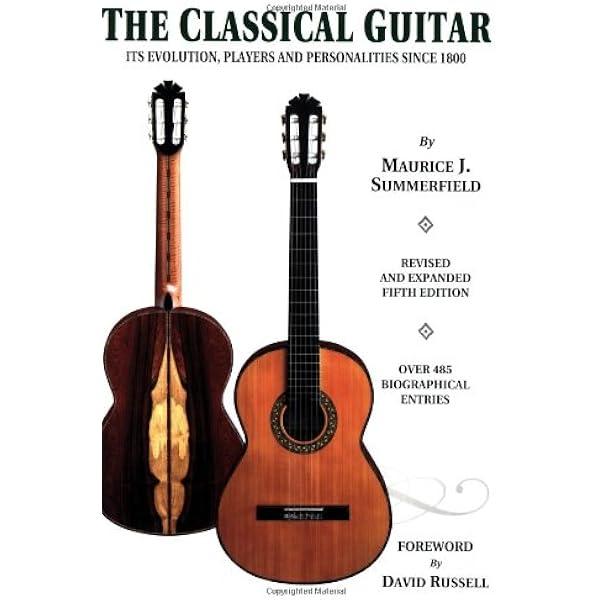
When does a passion for music transform into a lifelong commitment? Witnessing Alex Turner’s journey from aspiring musician to one of the best guitarists of his generation offers profound insights. He began playing guitar during his formative years, around the age of fifteen. This was a period defined by discovery and exploration, where the acoustic strings became vessels for his burgeoning creativity. Friends and family remember Alex’s early fascination, a spark ignited as he fumbled through chords, gradually mastering the basics with determination.
His growth was remarkable. Initially self-taught, Alex embraced a hands-on approach, drawing inspiration from a diverse range of artists. I vividly recall those pivotal years, akin to many aspiring musicians, when simple strumming evolved into more complex guitar techniques, laying the groundwork for his distinct style. Through dedicated practice, the nuances of *fingerpicking* and *rhythmic variation* became part of his expressive toolkit, underscoring the dedication required to truly wield the guitar with purpose.
Where Does He Draw Inspiration From?

Can a single artist truly encapsulate the many influences that shaped their sound? This question lingered in my mind as I delved into Alex Turner’s musical journey. In my experience speaking with artists, I’ve learned that diverse inspirations can *culminate in a distinct voice*, echoing in Turner’s innovative musical style. Turner’s music embodies a *tapestry woven from varying strands*: from the raw indie grit of The Strokes to the lyrical prowess of Bob Dylan, each influence leaves an indelible mark.
Turner’s *distinct blend of styles* is evident in his multifaceted guitar techniques, where he marries rich rhythm with melodic introspection. It’s in the shadow of icons like David Bowie and the poetic storytelling of Leonard Cohen that Turner finds his lyrical muse. He channels this inspiration through the *sultry tones* of his Fender Jazzmaster and the rich timbre of Gretsch guitars, crafting sounds that linger long after the final chord fades.
Through layers of *intricate soundscapes*, Turner distills the essence of his influences into what becomes uniquely his own. His art is not a mere imitation but an *evolution*, a testament to how deeply entwined inspiration and personal expression can be. This exploration of diverse sounds is what sets Alex Turner apart and reaffirms his place in the tapestry of modern music history.
Why Is He Considered a Great Guitarist?
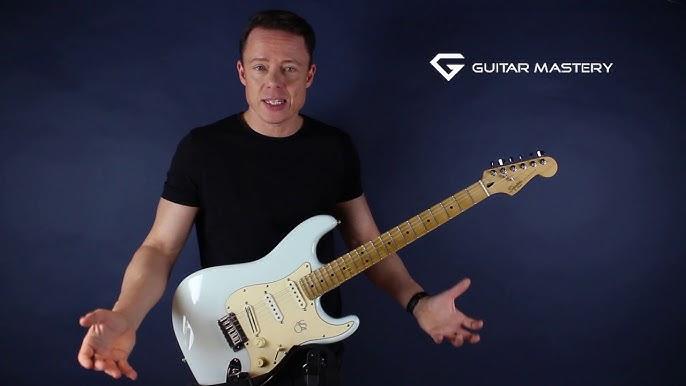
As someone who has spent two decades evaluating talent, I understand that true greatness lies in a guitarist’s ability to connect emotionally through their music, an area where Alex Turner excels. The Arctic Monkeys’ frontman is often lauded as one of the best guitarists of his generation. But is technical skill enough to define greatness in the world of guitar? In Turner’s case, it is his unique combination of technical prowess and emotional resonance that sets him apart.
Of course, Turner’s proficiency with the guitar is significant. His use of varied guitar techniques is impressive, seamlessly integrating intricate fingerpicking, bold strumming patterns, and innovative chord progressions into his music. Yet, the essence of his genius lies beyond mere technique—it is embedded in his ability to make each note tell a story, to make the guitar sing as if it’s in personal dialogue with the listener.
Turner’s impact is not measured just by his technical fluency but by how he translates personal and universal themes into the sonic texture of his songs. From powerful solos to evocative riffs, his guitar becomes a vessel for narrative, a tool for transformation. This emotional connectivity is his hallmark, making him an indispensable figure in modern music. Turner’s journey is a testament to the idea that great technical skill, while essential, becomes truly meaningful only when paired with the ability to emotionally resonate and move audiences.
How Does He Use Guitar Techniques in His Music?
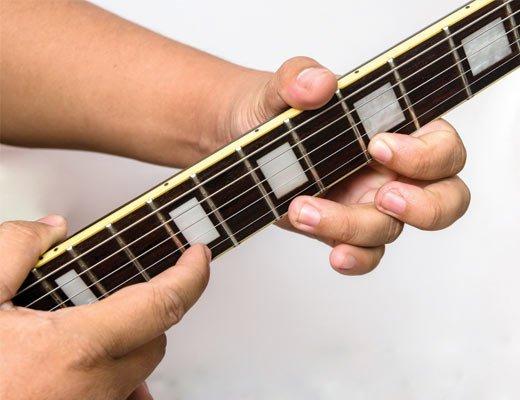
What role do innovative techniques play in shaping a modern sound? This question often circles in my mind as I delve into the guitar artistry of Alex Turner. Through many discussions with fellow guitarists, I’ve come to appreciate how Turner’s *innovative techniques* do more than just evoke emotion—they *redefine* contemporary music. His approach intertwines traditional methods with experimental flair, keeping listeners both challenged and captivated.
In examining his music, Turner’s **use of guitar techniques** stands out as a defining characteristic of his style. From the Arctic Monkeys’ debut to his work with The Last Shadow Puppets, Turner seamlessly blends intricate picking with expressive strumming. His knack for bending and sliding notes adds a *layered texture*, making each song a rich auditory experience. These techniques, when paired with his distinct vocal delivery, create a perfect storm that encapsulates the restless energy of the genre.
Armed with a nuanced understanding of music and an impressive *music gear rundown*, Turner has crafted a soundscape that feels fresh yet familiar. Whether wielding a Fender Jazzmaster or a Gretsch, his adaptability and creative prowess are undeniable. It is through this lens of innovation that Turner’s music continues to *resonate with audiences*, embodying a rare depth and sophistication that many aspire to, yet few achieve.
FAQs
What guitars does Alex Turner use?
How does Alex Turner achieve his unique guitar tone?
What are some techniques used by Alex Turner in his guitar playing?
How has Alex Turner’s guitar style evolved over the years?
What role does guitar play in Alex Turner’s music composition?
Conclusion
In a world of fleeting fame, what marks an artist as truly unforgettable? Reflecting on the careers of many legendary guitarists, I can confidently say that Alex Turner’s contributions will resonate for generations, making him an enduring figure in music. His journey with the guitar, from mastering the nuances of the Fender Jazzmaster to the distinctive tones of Gretsch and the Ovation Viper, showcases his relentless pursuit of sonic versatility. These instruments have become synonymous with Turner’s rich sound and are crucial to his *status* as one of the *best guitarists* of his generation.
Turner’s ingenious blend of techniques, from delicate fingerpicking to powerful strumming, coupled with his ability to draw *inspiration* from a wide range of musical influences, sets him apart from his peers. This unique synthesis of equipment, technique, and style not only defines his personal artistry but also leaves a profound impact on the music landscape. His guitar journey is a testament to the enduring power of *creative innovation* and the *passion that drives artistic legacy*.
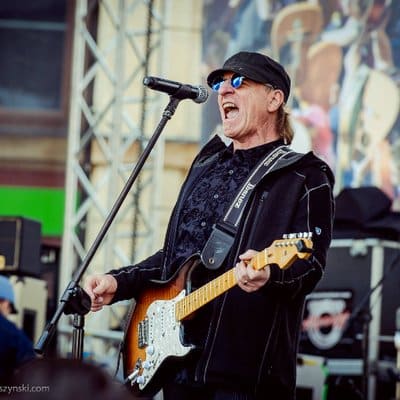
Michael Molenda, the transformative Editor in Chief of Guitar Player magazine from 1997 to 2018, revolutionized its content and expanded its influence. With over 2,500 published works, including in-depth interviews and technical analyses, he’s a giant in guitar journalism. Post-Guitar Player, he launched CONTENT BY MOLENDA and co-founded music websites, bringing his unmatched expertise to the forefront of music marketing. At Fretterverse, Molenda continues to shape the guitar world with insightful commentary and trendsetting journalism.
